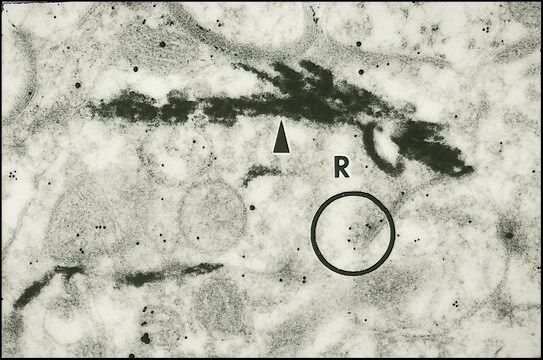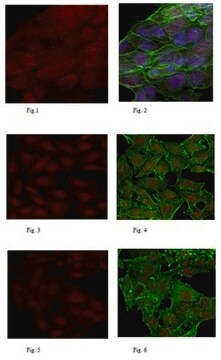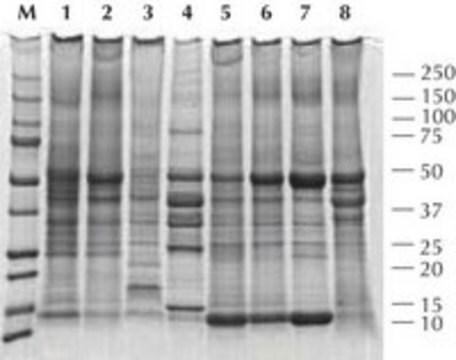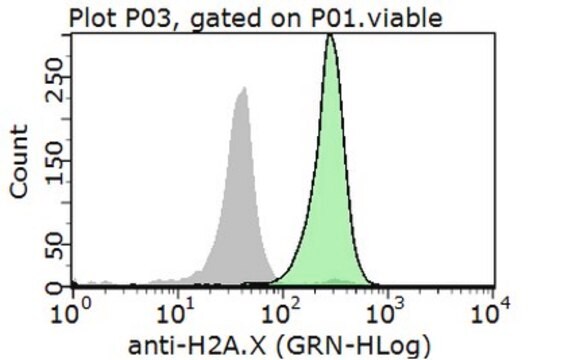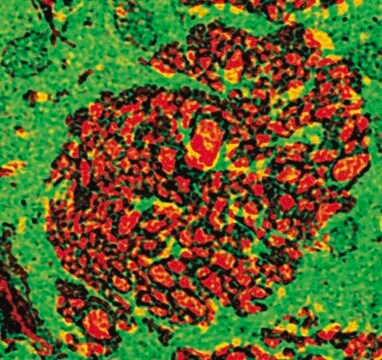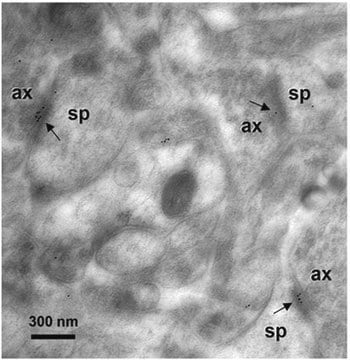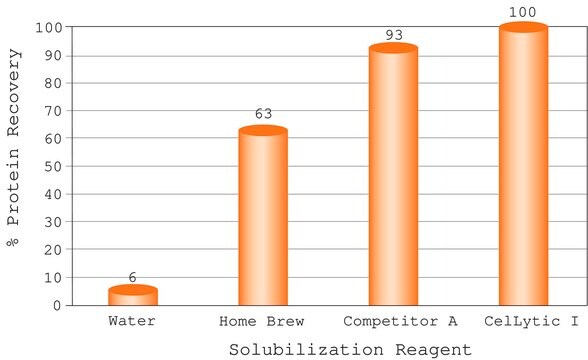おすすめの製品
由来生物
mouse
抗体製品の状態
purified antibody
抗体製品タイプ
primary antibodies
クローン
monoclonal
交差性
rat
メーカー/製品名
Chemicon®
テクニック
immunohistochemistry: suitable
アイソタイプ
IgM
輸送温度
dry ice
ターゲットの翻訳後修飾
unmodified
特異性
Glutamate
The cross-reactivities were determined using an ELISA test by competition experiments with the following compounds:
Compound Cross-reactivity
Glutamate-G-BSA 1
Aspartate-G-BSA 1/100,000
GABA-G-BSA 1/100,000
Glutamate 1/100,000
Abbreviations:
(G) Glutaraldehyde
(BSA) Bovine Serum Albumin
NOTE: Antibody reactivity REQUIRES glutaraldehyde fixation thus some glutaraldehyde (0.5%-2.0%) needs to be included in the tissue fixation procedure inorder for the proper reactivity.
The cross-reactivities were determined using an ELISA test by competition experiments with the following compounds:
Compound Cross-reactivity
Glutamate-G-BSA 1
Aspartate-G-BSA 1/100,000
GABA-G-BSA 1/100,000
Glutamate 1/100,000
Abbreviations:
(G) Glutaraldehyde
(BSA) Bovine Serum Albumin
NOTE: Antibody reactivity REQUIRES glutaraldehyde fixation thus some glutaraldehyde (0.5%-2.0%) needs to be included in the tissue fixation procedure inorder for the proper reactivity.
免疫原
Glutamate-Glutaraldehyde-BSA.
アプリケーション
Research Category
ニューロサイエンス
ニューロサイエンス
Research Sub Category
神経伝達物質及び受容体
神経炎症及び疼痛
神経伝達物質及び受容体
神経炎症及び疼痛
Anti-Glutamate Antibody detects level of Glutamate & has been published & validated for use in IH.
Immunohistochemistry: 1:2,500-1:10,000 using free floating sections by the PAP technique on rat hippocampus.
Optimal working dilutions must be determined by end user.
PROTOCOL for Glutamate Detection by Immunohisto/cytochemistry. Example for a rat brain.
1. SOLUTIONS TO BE PREPARED - Solution must be prepared as needed.
Solution A: 0.1M cacodylate, 10g/L sodium metabisulfite, pH 6.2.
Solution B: 0.1M cacodylate, 10g/L sodium metabisulfite, 3-5% glutaraldehyde, pH 7.5.
2. RAT PERFUSION - The rat is anaesthetized with sodium pentobarbital or Nembutal and perfused intracardially through the aorta using a pump with Solution A (30 mL): 150-300 mL/min, Solution B (500 mL): 150-300 mL/min.
3. POST FIXATION: 15 to 30 minutes in Solution B, then 4 soft washes in 0.05M Tris with 8.5 g/L sodium metabisulfite, pH 7.5 (Solution C) .
4. TISSUE SECTIONING: Vibratome or cryostat sections can be used.
5. REDUCTION STEP: Sections are reduced with Solution C containing 0.1M sodium borohydride for 10 minutes. The sections are washed 4 times in solution C without sodium borohydride.
6. APPLICATION OF GLUTAMATE ANTIBODY: Use a final dilution of 1:2,500-1:10,000 in Solution C containing 0.1% Triton X100 and 2% non-specific serum. Incubate 12 sections per 2 mL diluted antibody overnight, +2-8°C. Then wash the sections three times for 10 minutes each in Solution C. (Note that the antibody may be usable at a higher dilution. This should be explored to minimize the possibility of high background. Additionally, note that a change in the buffering system as indicated in the protocol may change the background and antibody recognition). The specific reaction is then revealed by PAP procedure.
7. SECOND ANTIBODY: Incubate the sections with a 1:50 to 1:200 dilution of goat anti-mouse in Solution B containing 1% non-specific serum for either 3 hrs at 20°C or 1-2 hr at 37°C. Then wash the sections, 3 times, for 10 minutes each with Solution C.
8. PAP: Incubate the sections with the appropriate dilution of peroxidase anti-peroxidase (for free floating method) in Solution C for 1-2 hours at 37°C. Then wash sections 3 times for 10 min each in solution C.
9. VISUALIZATION: The antigen-antibody complexes are visualized using DAB-4-HCl (25 mg/100 mL) (or other chromogen) in 0.05M Tris and filtrated; 0.05% hydrogen peroxide is added. Incubate the sections for 10 minutes at room temp. Stop the reaction by transferring the sections to 5 mL 0.05M Tris. Mount sections on chrome-alum coated slides. Dry overnight at 37°C. Rehydrate sections using conventional histological procedures. Coverslip using rapid mounting media.
For research use only; not for use as a diagnostic.
Optimal working dilutions must be determined by end user.
PROTOCOL for Glutamate Detection by Immunohisto/cytochemistry. Example for a rat brain.
1. SOLUTIONS TO BE PREPARED - Solution must be prepared as needed.
Solution A: 0.1M cacodylate, 10g/L sodium metabisulfite, pH 6.2.
Solution B: 0.1M cacodylate, 10g/L sodium metabisulfite, 3-5% glutaraldehyde, pH 7.5.
2. RAT PERFUSION - The rat is anaesthetized with sodium pentobarbital or Nembutal and perfused intracardially through the aorta using a pump with Solution A (30 mL): 150-300 mL/min, Solution B (500 mL): 150-300 mL/min.
3. POST FIXATION: 15 to 30 minutes in Solution B, then 4 soft washes in 0.05M Tris with 8.5 g/L sodium metabisulfite, pH 7.5 (Solution C) .
4. TISSUE SECTIONING: Vibratome or cryostat sections can be used.
5. REDUCTION STEP: Sections are reduced with Solution C containing 0.1M sodium borohydride for 10 minutes. The sections are washed 4 times in solution C without sodium borohydride.
6. APPLICATION OF GLUTAMATE ANTIBODY: Use a final dilution of 1:2,500-1:10,000 in Solution C containing 0.1% Triton X100 and 2% non-specific serum. Incubate 12 sections per 2 mL diluted antibody overnight, +2-8°C. Then wash the sections three times for 10 minutes each in Solution C. (Note that the antibody may be usable at a higher dilution. This should be explored to minimize the possibility of high background. Additionally, note that a change in the buffering system as indicated in the protocol may change the background and antibody recognition). The specific reaction is then revealed by PAP procedure.
7. SECOND ANTIBODY: Incubate the sections with a 1:50 to 1:200 dilution of goat anti-mouse in Solution B containing 1% non-specific serum for either 3 hrs at 20°C or 1-2 hr at 37°C. Then wash the sections, 3 times, for 10 minutes each with Solution C.
8. PAP: Incubate the sections with the appropriate dilution of peroxidase anti-peroxidase (for free floating method) in Solution C for 1-2 hours at 37°C. Then wash sections 3 times for 10 min each in solution C.
9. VISUALIZATION: The antigen-antibody complexes are visualized using DAB-4-HCl (25 mg/100 mL) (or other chromogen) in 0.05M Tris and filtrated; 0.05% hydrogen peroxide is added. Incubate the sections for 10 minutes at room temp. Stop the reaction by transferring the sections to 5 mL 0.05M Tris. Mount sections on chrome-alum coated slides. Dry overnight at 37°C. Rehydrate sections using conventional histological procedures. Coverslip using rapid mounting media.
For research use only; not for use as a diagnostic.
物理的形状
Format: Purified
Liquid in PBS containing 10mM sodium azide.
保管および安定性
Maintain at 2-8°C in undiluted aliquots for up to 6 months after date.
法的情報
CHEMICON is a registered trademark of Merck KGaA, Darmstadt, Germany
免責事項
Unless otherwise stated in our catalog or other company documentation accompanying the product(s), our products are intended for research use only and are not to be used for any other purpose, which includes but is not limited to, unauthorized commercial uses, in vitro diagnostic uses, ex vivo or in vivo therapeutic uses or any type of consumption or application to humans or animals.
適切な製品が見つかりませんか。
製品選択ツール.をお試しください
保管分類コード
12 - Non Combustible Liquids
WGK
WGK 2
引火点(°F)
Not applicable
引火点(℃)
Not applicable
適用法令
試験研究用途を考慮した関連法令を主に挙げております。化学物質以外については、一部の情報のみ提供しています。 製品を安全かつ合法的に使用することは、使用者の義務です。最新情報により修正される場合があります。WEBの反映には時間を要することがあるため、適宜SDSをご参照ください。
Jan Code
MAB5304:
試験成績書(COA)
製品のロット番号・バッチ番号を入力して、試験成績書(COA) を検索できます。ロット番号・バッチ番号は、製品ラベルに「Lot」または「Batch」に続いて記載されています。
Monoclonal antibody directed against glutaraldehyde conjugated glutamate and immunocytochemical applications in the rat brain.
Chagnaud, J L, et al.
Brain Research, 481, 175-180 (1989)
Spatial learning and memory deficit of low level polybrominated diphenyl ethers-47 in male adult rat is modulated by intracellular glutamate receptors.
Tang Yan,Li Xiang,Jiang Xuejun,Chen Chengzhi,Qi Youbin,Yu Xuelan,Liu Yang,Peng Changyan,Chen Hui
The Journal of Toxicological Sciences null
Anatomical characterization of a rabbit cerebellar eyeblink premotor pathway using pseudorabies and identification of a local modulatory network in anterior interpositus.
Gonzalez-Joekes, J; Schreurs, BG
The Journal of Neuroscience null
Lin Cheng et al.
Cell research, 24(6), 665-679 (2014-03-19)
Neural progenitor cells (NPCs) can be induced from somatic cells by defined factors. Here we report that NPCs can be generated from mouse embryonic fibroblasts by a chemical cocktail, namely VCR (V, VPA, an inhibitor of HDACs; C, CHIR99021, an
ライフサイエンス、有機合成、材料科学、クロマトグラフィー、分析など、あらゆる分野の研究に経験のあるメンバーがおります。.
製品に関するお問い合わせはこちら(テクニカルサービス)